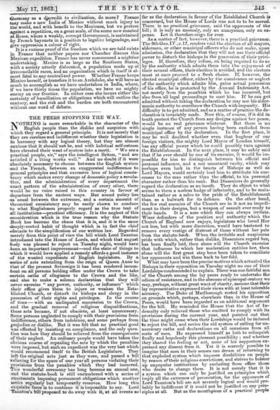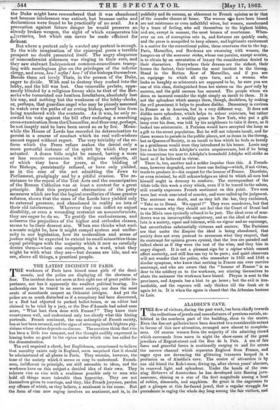THE PEERS STOPPING THE WAY.
INTOTHING is more remarkable in the character of the English people than the -dislike and suspicion with which they regard a general principle. It is not merely that they are careless and indifferent whether their legislation is in harmony with any logical theory, but they are almost anxious that it should-not be, and with habitual self-esteem have elevated their want of system into a merit. " We area practical people, sir," says the intelligent Briton, "and are satisfied if a thing works well." And no doubt if it were absolutely necessary to choose between the English system and the French, between an exaggerated indifference to general principles and that excessive love of logical consis- tency which makes every change of domestic •policy a revolu- tion, and the administration of every department the -exact pattern of the administration of every other, there would be- no voice raised in this country in favour of departure from the ancient ways. But sound policy lies sae usual between the extremes, and a certain amount of theoretical consistency may be easily shown to conduce to what Englishmen properly regard as the true test of all institutions—practical efficiency. It is the neglect of this 'consideration which is the true reason why the Statute Book has become the chaos that it is, and it is the same '.deeply-rooted habit of thought which is in fact the chief -obstacle to the simplification of our written law. Regarded merely from this point of view the bill which Lord Taunton introduced into the House of Lords, and which that august body was pleased to reject on Tuesday night, would have been an important improvement—and the state of things to -which it would have applied a remedy affords a good instance -of the wonted expedients of English legislators. By a series of acts extending from the reign of Queen Anne to that of the present Sovereign it has been rendered incum- bent on all persons holding office under the Crown to take certain oaths of allegiance to the Crown and the like, • and also to make a solemn declaration that they will never exercise " any power, authority, or influence" which their office gives them to injure or weaken the Esta- blished Church, or disturb its bishops and clergy in the possession of their rights and •privileges. In the course of time— with an undisputed succession to the Crown, and the gradual removal of religious disqualifications, these acts became, if not obsolete, at least unnecessary. Some persons neglected to comply with their provisions from indifference, others from indolence, and some perhaps from prejudice or dislike. But it was felt that no practical good was effected by insisting on compliance, and the only ques- tion was how they should be relieved from the consequences of their neglect. An ordinary people would have taken the Obvious course of repealing the acts by which the penalties were imposed, but such an expedient was the very last which would recommend itself to the British Legislature. They left the original acts just as they were, and passed a bill -relieving for the space of one year all persons violating their provisions from the penalties which they had incurred. This wonderful ceremony has long become an annual one, and the statute-book is still encumbered with a series of enactments imposing permanent obligations which another series regularly but temporarily removes. How long this exquisite farce is to continue it is impossible to say. Lord Taunton's bill proposed to do away with it, at all events so far as the declaration in favour of the Established Church is concerned, but the House of Lords was not to to be moved. There is no practical grievance, said the opponents of the i bill; it is only an anomaly, only an annoyance, only an ex- pense. Let it therefore reign for ever. As a matter of fact, however, there is a practical grievanae. The 9th Geo.IV.,c.17, renders void the election of all mayors, aldermen, or other municipal officers who do not make, upon admission, the declaration that they will not use their official power to disturb the bishops in the possession of their privi- leges. If, therefore, they refuse, on being required to do so by the authority which admits them into the enjoyment of their several offices, their election is avoided, and the electors must at once proceed to a fresh choice. If, however, the elected municipal officer, either b,y the connivance or neglect of the authority which admits him, gains actual possession of his office, he is protected by the Annual Indemnity Act, not merely from the penalties which he has incurred, but also from all legal proceedings to oust him. If he can get admitted without taking the declaration he may use his alder- manic authority to overthrow the Church with impunity. His difficulty is to get admitted, and as a matter of practice the de- claration is invariably made. Now this, of course, if it in truth protect the Church from any designs against her peace, would be no real grievance whatever. But there is no single instance of any person having been excluded from municipal office by the declaration. In the first place, it may be well doubted whether even that bugbear of our foreign visitors, the mighty Lord Mayor of London himself, has any official power which he could possibly tarn against the Establishment. In the next place, it may be safely said that if he ever should be one of its enemies, it would be im- possible for him to distinguish between his official and personal influence, and a not unnatural vanity, which may perhaps even lurk in the hearts of Bishops as well as Lord Mayors, would certainly lead him to attribute his suc- cesses to the man rather than the official, to his personal character rather than his rank. But Dissenters do generally regard the declaration as an insult. They do object to what seems to them a useless badge of inferiority, and to be main- tained rather as a salvo to the pride of the Establishment than as a bulwark for its defence. On the other hand, the few real enemies of the Church see in it not an impedi- ment to their designs, but a weapon of assault ever ready to their hands. It is a sore which they can always irritate. Wiser defenders of the position and authority which the Church of England now enjoys, legislators who loved Her not less, but with more discretion, would have hastened to remove every vestige of distrust of those without her pale from the statute-book. When the irritable and suspicious pride with which, rather than -dislike, Dissenters regard her, has been 'finally laid, then alone will the Church exercise that influence to which her moderation entitles her, then alone will the first great step have been taken to conciliate her opponents and win them back to her fold. What may have beenthe precise motives which actuated the Bishops in-their opposition en Tuesday night no one of their Lordships condescended to explain. There was onefaithful son of the Church among the lay peers ready to undertake the odium of resistance, and in the absence of episcopal oratory we may, perhaps, without great want of charity, assume that their lay representative expressed their views with at least tolerable accuracy. The Duke of Marlborough rested his opposition on grounds which, perhaps, elsewhere than in the House of Peers, would have been regarded as an additional argument for the bill. He reminded the House that the Act of In- demnity only relieved those who omitted to comply with its provisions daring the current year, and pointed out that the time might come when their Lordships would be induced to reject the bill, and revive the old system of calling for
un-
necessary oaths and •declarations on all occasions from all sorts of men. He expressed himself as loth to relinquish finally and hopelessly this pleasant possibility ; and whether they shared the feeling or not, none of his supporters ex- pressed any dissent from it. Yet it is scarcely possible to imagine that men in their senses can dream of returning to that exploded system which imposes disabilities on people by reason &their religious convictions, and strives to bolster up unpopular institutions by excluding from office those who desire to change them. It is not merely that -it is a system which can only be justified on principles which imply all the extremes of persecution, for the opponents of Lord Taunton's bill are not severely logical and would pro- bably be indifferent if it could not be justified on any plan- ciples at all. But as the mouthpiece -of a practical people
the Duke might have remembered that it was abandoned not because intolerance was extinct, but because oaths and declarations were found to be practically of no avail. As a precaution against future danger he would preserve an already broken weapon, the sight of which exasperates his att'ffsaries, but which can never be made efficient for
defentei
But where a pretext only is wanted any pretext is enough. To the wide imagination of the episcopal peers a terrible prospect no doubt presented itself. The angry eloquence of nonconformist aldermen was ringing in their ears, and they saw stalwart Independent common-councilmen tramp- ling with sacrilegious glee on the privileges of the inferior clergy, and even, hem neits 1 hem of the bishops themselves. Beside them sat lovely Thais, in the person of the Duke, eager to divide. With zeal to destroy they rushed into the lobby, and the bill was lost. One venerable prelate, appa- rently blinded by a religious frenzy akin to that of the Ber- serks who tormented our heathen forefathers, absolutely lost his way, and nothing but the weakness of the lobby-clerks, or, perhaps, that guardian angel who may be piously assumed to watch over the paths of an erring bishop, saved him from being numbered with the contents. As it was, he only re- corded his vote against the bill after enduring a searching cross-examination from the Chancellor, and thus may, perhaps, be not inaptly said to have been saved so as by fire. Mean- while the House of Lords has recorded its determination to persist in a course of conduct which its real well-wishers cannot regard without regret. The very triviality of the re- form which the Peers refuse makes the denial only a more powerful instance of the spirit by which they are actuated. A dozen bills might be named, having a more or less remote connexion with religious subjects, all of which they have for years, at the bidding of the Bishops, persistently refused, or have only yielded, as in the case of the act admitting the Jews to Parliament, grudgingly and by a pitiful evasion. The re- sistance to the repeal of the Test Acts and the emancipation of the Roman Catholics was at least a contest for a great principle. But this perpetual obstruction of the petty measures which are but the logical corollaries of those greater reforms, shows that the mass of the Lords have yielded only to external pressure, and abandoned in reality no iota of their old intolerance. Wherever they can inflict an unjust disability, or even a wounding restraint on nonconformists, they are eager to do so. To gratify the exclusiveness, and subserve the prejudices of the higher and orthodox classes, seems to be their dearest aim. When one thinks what such a senate might be, how it might compel system and unifor- mity in our legislation, how its moderation and sense of justice might be expected to extend to small minorities those equal privileges with the majority which it now as carefully denies them—when one compares, in a word, what they might be with what they are—but dreams are idle, and we are, above all things, a practical people.































 Previous page
Previous page